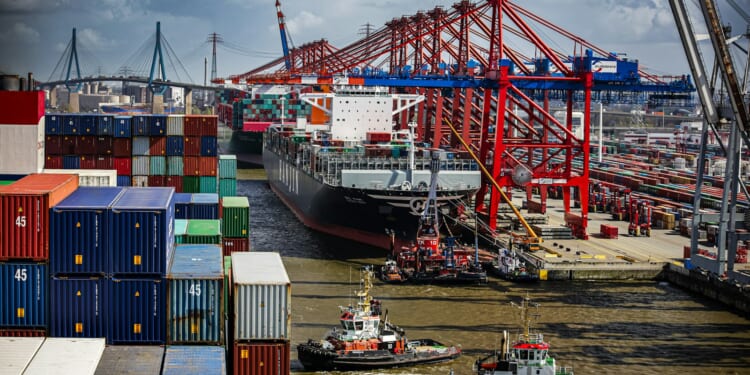David Gauke is a former Justice Secretary and was an independent candidate in South-West Hertfordshire at the 2019 general election.
Economists favour trade.
As the textbooks will tell us, it widens and deepens markets, allowing for greater specialisation and efficiency. It lower prices and extends choice for consumers. Exposure to foreign competition drives innovation and facilitates the type of creative destruction that is necessary for a dynamic economy. It creates investment opportunities, access to international supply chains and the wider take-up of new technology. In short, countries that are open to trade see their living standards increase.
Diplomats also tend to favour trade.
It is not impossible for countries that have deep trading relationship to go to war with each other, but it is unusual. Economic interdependence makes conflict less likely, as there is just too much to lose. Periods of expanding trade tend to coincide with periods of peace and stability (such as the post-1945 era); periods of declining trade (such as the 1930s) signal a more alarming prospect.
Until recently, most UK politicians would accept these arguments, at least in the abstract. A consensus existed that we were a country of free traders, looking outwards and desirous of removing trade barriers. Globalisation created its challenges and the benefits were not distributed equally, but in aggregate it was deeply beneficial and – even if we did not like it – there was no alternative but to go along with it. The anti-globalisation voices were on the fringes.
We should not exaggerate the extent to which the debate has shifted.
It remains the case that the economic consensus favours trade. Within the Treasury, for example, there is a strong institutional attachment to free trade. But more widely, the benefits of free trade (and trade in general) are now more questioned. There are broadly five arguments that we now hear with greater force.
The first is about the distributional impact of globalisation. It is an argument that has gained strength since the global financial crisis and the slowing down of economic growth in the developed world. It has coincided with political realignments in which the relative losers of globalisation have become more politically important. Arguments about re-industrialisation and bringing back the old jobs resonate. President Trump succeeded in winning the rustbelt on just this platform with promises of tariffs. It won’t work, of course, in that his tariff policies disrupt supply chains and increase economic uncertainty. Even if manufacturing were to increase, technology will see to it that manufacturing employment will continue to fall. Nonetheless, there is anger about the perceived impact of trade, and politicians are responding to it.
Second, given that the most important country in the world is turning its back on free trade, it is argued that it is naïve to carry on as if nothing has changed. This could result in a greater commitment to lower trade barriers between non-US countries, and there has been some evidence of this (the UK-India free trade deal, however minor, is probably only possible because of Trump). But there is also a response which is to follow down the same track, favouring domestic producers over overseas competition which is perceived as having unfair advantages. Once one big player becomes more protectionist, others will likely follow.
Third, there is the national security argument, driven by the rise of China and its move towards a more adversarial approach under President Xi. It is very much the issue of the day, given the row about the dropping of the spying charges and accusations that the Government is too soft on China for economic reasons. In the US, the shift to a more confrontational approach to China predates the second Trump term in that Bidenomics emphasised the need for economic policy to be aligned with national security policy. Rachel Reeves would speak of “securonomics” in much the same way. Chinese investment in areas of critical national infrastructure, for example, is no longer welcome in the way it once was. The Government, however, faces criticism for not going further.
Fourth, trade sanctions as a means of foreign policy have become more prominent.
Most obviously, and least controversially, western nations have sanctioned Russia after its invasion of Ukraine. But there are also calls for trade sanctions with China (over its treatment of the Uyghurs, and repression in Tibet and Hong Kong), Saudi Arabia or Israel, particularly in respect of military equipment. As anyone old enough to remember the sanctions debate in the context of apartheid South Africa will recall, such debates are not new, but in the era of social media and more polarised politics (particularly about the Middle East), campaigns to stop trade can quickly build up wide support.
The fifth argument is about democratic accountability. The reason why this is significant is that trade is as often as not impeded by non-tariff barriers as it is about tariff barriers. To remove such non-tariffs barriers will involve trade deals in which participants agree a common set of rules. But once a country has signed up to those rules, it is no longer possible to change them unilaterally, at least without losing market access to the consumers of the other party. In other words, domestically elected politicians no longer have complete control.
This, of course, is the essence of the Brexit debate. The European Single Market is an institution that closely integrates the rules of member states to facilitate trade within it. In doing so, it prevents an individual member state from departing from those rules. There is straightforward trade-off between market access and the ability for a country to set its own rules.
In terms of trade policy, the decision to leave the EU and its Single Market was by far the most momentous of recent decades.
It has made it harder to trade with our largest market and, to the extent that Rachel Reeves has an explanation for why she needs to increase taxes once again, she is likely to focus on the detrimental impact this decision has had on our economic performance. Nothing has particularly changed in the economic arguments since the last election campaign (when Labour had little to say about the topic), nor is it clear what she intends to do about it (the Government’s existing ambitions to move closer to the EU are unlikely to move the economic dial) but the evidence supports the contention that Brexit has damaged our economy.
This is a lesson that we should bear in mind whenever we consider constraining our ability to trade.
There may be good arguments why we do not want to trade with a country or, at the least, putting barriers in place. We should certainly be sanctioning Russia, and there are very good reasons to be wary about the Chinese. But these are not cost free choices.
In general, it is in our interests to be an open economy – open to trade and open to foreign direct investment. At a time when living standards are stagnant, taxes are high, public services under pressure, and politicians claim to be prioritising growth, we cannot forget that making it harder to trade comes at an economic price.








![Florida Officer Shot Twice in the Face During Service Call; Suspect Killed [WATCH]](https://www.right2024.com/wp-content/uploads/2025/12/Inmate-Escapes-Atlanta-Hospital-After-Suicide-Attempt-Steals-SUV-Handgun-350x250.jpg)

![Keith Ellison Caught Promising to Fight State Agencies for Somali Fraudsters [WATCH]](https://www.right2024.com/wp-content/uploads/2026/01/Keith-Ellison-Caught-Promising-to-Fight-State-Agencies-for-Somali-350x250.jpg)






